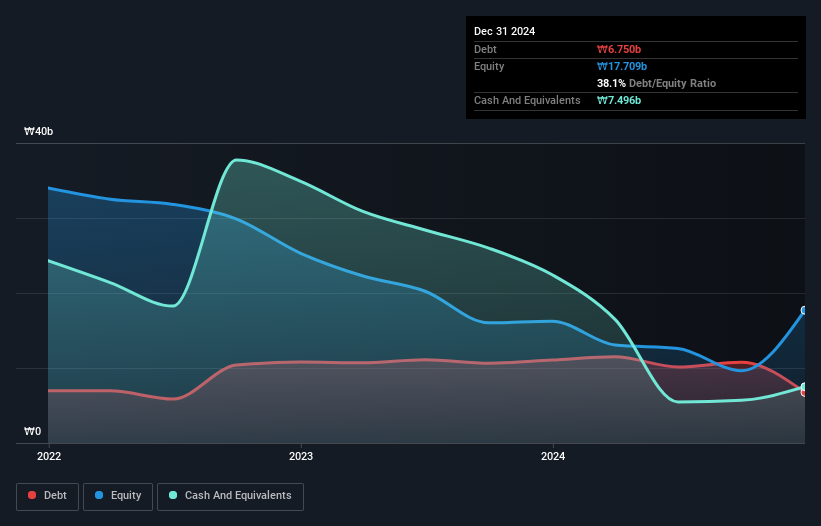
Warren Buffett famously said, 'Volatility is far from synonymous with risk.' It's only natural to consider a company's balance sheet when you examine how risky it is, since debt is often involved when a business collapses. Importantly, NGeneBio Co., Ltd. (KOSDAQ:354200) does carry debt. But is this debt a concern to shareholders?
When Is Debt A Problem?
Generally speaking, debt only becomes a real problem when a company can't easily pay it off, either by raising capital or with its own cash flow. In the worst case scenario, a company can go bankrupt if it cannot pay its creditors. While that is not too common, we often do see indebted companies permanently diluting shareholders because lenders force them to raise capital at a distressed price. Of course, the upside of debt is that it often represents cheap capital, especially when it replaces dilution in a company with the ability to reinvest at high rates of return. The first step when considering a company's debt levels is to consider its cash and debt together.
How Much Debt Does NGeneBio Carry?
You can click the graphic below for the historical numbers, but it shows that NGeneBio had ₩6.75b of debt in December 2024, down from ₩11.1b, one year before. But it also has ₩7.50b in cash to offset that, meaning it has ₩747.0m net cash.

How Strong Is NGeneBio's Balance Sheet?
We can see from the most recent balance sheet that NGeneBio had liabilities of ₩12.5b falling due within a year, and liabilities of ₩2.72b due beyond that. Offsetting this, it had ₩7.50b in cash and ₩761.8m in receivables that were due within 12 months. So it has liabilities totalling ₩6.98b more than its cash and near-term receivables, combined.
Of course, NGeneBio has a market capitalization of ₩34.9b, so these liabilities are probably manageable. Having said that, it's clear that we should continue to monitor its balance sheet, lest it change for the worse. Despite its noteworthy liabilities, NGeneBio boasts net cash, so it's fair to say it does not have a heavy debt load! The balance sheet is clearly the area to focus on when you are analysing debt. But you can't view debt in total isolation; since NGeneBio will need earnings to service that debt. So when considering debt, it's definitely worth looking at the earnings trend. Click here for an interactive snapshot.
View our latest analysis for NGeneBio
Over 12 months, NGeneBio reported revenue of ₩5.7b, which is a gain of 31%, although it did not report any earnings before interest and tax. With any luck the company will be able to grow its way to profitability.
So How Risky Is NGeneBio?
Statistically speaking companies that lose money are riskier than those that make money. And the fact is that over the last twelve months NGeneBio lost money at the earnings before interest and tax (EBIT) line. Indeed, in that time it burnt through ₩13b of cash and made a loss of ₩13b. Given it only has net cash of ₩747.0m, the company may need to raise more capital if it doesn't reach break-even soon. With very solid revenue growth in the last year, NGeneBio may be on a path to profitability. By investing before those profits, shareholders take on more risk in the hope of bigger rewards. The balance sheet is clearly the area to focus on when you are analysing debt. However, not all investment risk resides within the balance sheet - far from it. For example, we've discovered 4 warning signs for NGeneBio (2 are a bit concerning!) that you should be aware of before investing here.
If, after all that, you're more interested in a fast growing company with a rock-solid balance sheet, then check out our list of net cash growth stocks without delay.
Valuation is complex, but we're here to simplify it.
Discover if NGeneBio might be undervalued or overvalued with our detailed analysis, featuring fair value estimates, potential risks, dividends, insider trades, and its financial condition.
Access Free AnalysisHave feedback on this article? Concerned about the content? Get in touch with us directly. Alternatively, email editorial-team (at) simplywallst.com.
This article by Simply Wall St is general in nature. We provide commentary based on historical data and analyst forecasts only using an unbiased methodology and our articles are not intended to be financial advice. It does not constitute a recommendation to buy or sell any stock, and does not take account of your objectives, or your financial situation. We aim to bring you long-term focused analysis driven by fundamental data. Note that our analysis may not factor in the latest price-sensitive company announcements or qualitative material. Simply Wall St has no position in any stocks mentioned.
About KOSDAQ:A354200
NGeneBio
Develops in vitro diagnostics companion diagnostics products and bioinformatics software.
Adequate balance sheet slight.
Market Insights
Community Narratives


